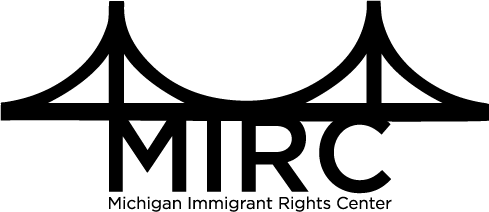Immigration Legal Services
MIRC Immigration Law Priorities for Direct Representation
All of our services are free to our clients, and immigration cases can be long and complex, so we have to make difficult decisions about what cases we can take for full representation. The communities we serve bring us the immigration law problems they need help with, and based on their feedback, their situations, and what funding we can find to meet the needs, we decide on "priority" cases that we can accept for full representation. When a person seeking help calls MIRC at (734) 239-6863, we ask screening questions. If the person's case is not within our priorities, we share legal information and referrals but we do not accept their case. If it is within our priorities, we conduct a full intake so that we can learn all about the case and make a decision about whether we can accept it either for direct representation with MIRC or placement with a pro bono attorney. When a case is outside of our priorities, it doesn't mean that we don't care about the person or their legal problem; it means that we don't have enough resources to take it on.
What types of cases does MIRC not provide advice or representation?
We don’t do any employment-based immigration cases because, generally, the employer has to be the client and we only represent people who cannot afford to pay for attorneys. That also means that generally, our threshold for service is household income at or below 200% of the federal poverty guidelines with some exceptions: cases involving domestic violence, naturalization/citizenship, and services available through the Detroit Immigration Court Helpdesk.
What types of cases does MIRC take for advice and representation? Certain place-based and case-based cases.
- Place-based: When we have funders and donors who support our general immigration law work in their local area in Michigan, we can accept any type of family-based or humanitarian immigration case from people living in that area. Currently, we can accept general immigration law cases for residents of: Kalamazoo County, Washtenaw County, and Detroit Metro (Macomb, Oakland, and Wayne Counties).
- Case-based: We also have funding that allows us to accept certain types of cases for clients living anywhere in Michigan. We have higher capacity for these types of cases in Kent County. This includes cases for survivors of domestic and intimate partner violence, cases for unaccompanied children, applications for U.S. citizenship (naturalization and related applications), people who are mentally ill and in deportation (removal) proceedings in Immigration Court and can’t advocate for themselves. We provide full intakes and legal advice to everyone detained by Immigration and Customs Enforcement (ICE) in Michigan and consider their cases for full representation if they fit into a place-based or case-based priority. We have a separate intake line for immigrant worker rights cases that we operate jointly with Farmworker Legal Services of Michigan: 1-800-968-4046. We have a separate set of priorities for full representation in employment law cases for immigrant workers. At times, we might have additional capacity to do other special projects to meet emergent needs in immigrant communities.
“My case was within these priorities, so why didn’t MIRC didn’t take it?”
Sometimes, a case is within our priorities but we can’t take it because our caseloads are already too high to give new clients the attention they need. Some of our cases take many years to complete because of immigration court calendars and government processing times, and we often have to work on them long after grants have ended. When we can’t take a priority case, we give callers as much legal advice and self-help information as possible as well as referrals to other attorneys and organizations.
Sometimes we have a conflict of interest, meaning that we can’t represent a new caller because of some history or relationship between that caller and another one of our clients. When that happens, we can’t explain in detail because of our obligation to our existing client.
Often, we don’t take cases because, unfortunately, there is nothing that can be done--the law doesn’t provide a tool/path to meet the client’s goal. So, our policy advocacy team keeps working to change the system!

